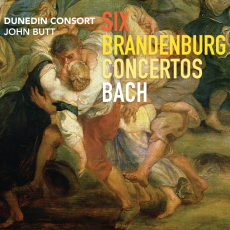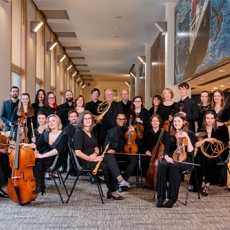Dunedin Consort - J.S. Bach: Six Brandenburg Concertos - Bangkok Post
You say that, as a classical collector, there are at least 74 recordings that you need to buy before investing in yet another version of Bach's Brandenburg Concertos? That you already have a version of choice (possibly Alessandrini's or Gardiner's most recent account), or maybe several, that aren't likely to be superseded in your affections any time soon? Listen to a few excerpts from this set on the Linn Records website and you may decide that there is still room on your culture shelf for one more set.
The Dunedin Consort have already made a number of lavishly-praised recordings of music by Bach, including accounts of the St John and St Matthew Passions and the Mass in B Minor...As the First Brandenburg Concerto begins, listeners who know Gardiner's account will notice that the horns have the same brash and raw sound. In his detailed notes to these performances, conductor John Butt points out that in courts like Coethen, where Bach was working at the time when these concertos were composed, hunting stood in for military might, and that the horn players, who were usually also trumpeters, were the highest-paid musicians in court orchestras. The more horn players of high quality that a prince had in his employ, the richer his court appeared.
Butt goes on to mention that there is evidence that the concerto still plays well if the horns are omitted, and that Bach may have permitted this practise ‘as a critique of social hierarchy', but also that ‘the horns contribute immensely to the style and ethos of the piece with their unabashed hunting calls. Indeed, Bch seems to have gone out of his way to make the horns clash against the rest of the texture'. Listeners will be happy that Butt stuck with sonority rather than politics here, as it is the raucous sound of the horns, played for all they are worth here, that gives the piece much of its character.
No one can imagine the Second Brandenburg with the trumpet omitted or replaced by another instrument. In this recording it is played with the greatest virtuosity by consort member David Blackadder and recorded in a way that allows its silvery tone to blend naturally with the ensemble. In traditional recordings the instrument stands out so prominently that it completely dominates the busy discourse. Here it participates with the other instruments as an equal, lending its special personality and colour to the musical phrases it discusses with the oboe, recorder and violin, so that the piece doesn't seem as much like a trumpet concerto as it does in many other accounts.
A similar approach is used in Dunedin's irresistible performance of the Fifth Concerto. Despite the starring role given the harpsichord in the opening 'Allegro', it is not given the kind of spotlighting and enhanced sonority that is has in most other recordings. Here the instrument, played by conductor Butt himself, is allowed by the recording engineers to retain its natural timbre and dynamic, so that it doesn't shove its way forward for a star turn. Its sound and presence in this recording are ideally balanced with those of the other instruments...A challenge to the engineers, and well met. Butt plays the big cadenza in the first movement with great virtuosity...
Butt's notes to this release make it clear that he has researched the Brandenburgs and their performance tradition in the greatest detail, and has made used of his knowledge in these accounts. One major result is his adopting of a pitch lower than the one notated, reflecting what he believes is close to what was used in Bach's performances at Coethen in an era where pitch was not strictly standardised. The enrichment of tone permitted by this downward tuning is especially noticeable in the dark string sonorities of the Sixth concerto. But there is no scholarly dust on the performances, which are thrilling and vibrant throughout, with brisk but not excessively fast tempos.
Listeners who have players that can handle high-resolution FLAC files should consider going to the Linn website and buying the Studio Master version (24Bit 192kHz), which requires a hefty 4GB download. It is also available as lower resolution downloads and also as a set of multichannel CDs. But the sound of the Studio Master recordings is absolutely spectacular, with the presence of the instruments almost tangible. As a set of performances, Dunedin's versions are a good first choice...

